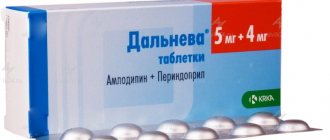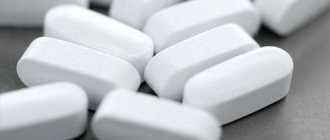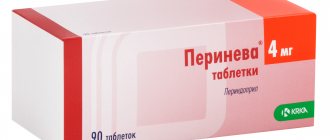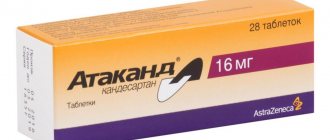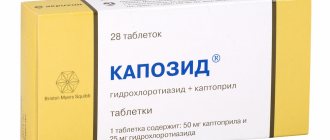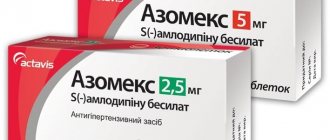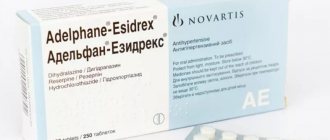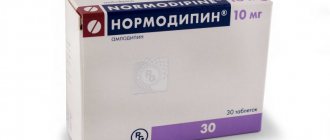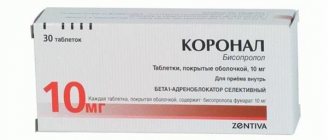Health problems associated with blood pressure are a common problem of our time.
Its increase is dangerous not only for health, but also for life.
It provokes heart attack, heart failure, vascular diseases, and stroke.
Constant headaches and deterioration in health cannot be ignored. It is necessary to seek medical help and not self-medicate, because your future health is at stake. The doctor will select therapy based on the patient’s medical history.
All hypertensive patients suffer in search of an effective remedy that helps reduce the constantly growing tonometer readings. One of these drugs is Amlotop. Its action is aimed at reducing blood pressure and normalizing the general condition.
When taken, the active substance is slowly absorbed, which allows you to lower blood pressure without sudden jumps for a long period. Gently affecting the body, it dilates blood vessels and helps increase the volume of oxygen supplied to the heart muscle.
Letters from our readers
Topic: Grandma's blood pressure has returned to normal!
From: Christina ( [email protected] )
To: Administration otgipertonii.ru
Christina, Moscow
My grandmother’s hypertension is hereditary - most likely, I will have the same problems as I get older.
I accidentally found an article on the Internet that literally saved my grandmother. She was tormented by headaches and had a repeated crisis. I bought the course and monitored the correct treatment.
After 6 weeks she even started talking differently. She said that her head no longer hurts, but she still takes pills for blood pressure. I am sending a link to the article
Indications for use
The product can be used either alone or in tandem with other medications.
Indicated for:
Don't tolerate high blood pressure
Now hypertension can be cured by restoring blood vessels...
>
- arterial hypertension;
- stable angina pectoris;
- ST segment depression
It is not recommended to self-medicate, as health problems may arise in the future.
For whom is it contraindicated?
Medical specialists strictly prohibit patients with the following clinical contraindications from drinking Amlotop for high blood pressure:
- Hypotonic disease (low blood pressure);
- Collapse;
- Aortic stenosis;
- Individual intolerance and hypersensitivity to the ingredients contained in the tablets;
- Shock state of cardiogenic nature;
- Hypolactasia;
- Severe left ventricular failure.
Amlotop for high blood pressure is not used to treat women expecting the birth of a baby, breastfeeding mothers, or young patients under the age of majority.
The drug is prescribed with great caution to patients with diagnosed mitral stenosis, hypertrophic cardiomyopathy, liver dysfunction, and acute myocardial infarction.
Treatment of this category of patients requires careful, individual selection of a safe dose, strict, constant medical supervision, and regular monitoring of the patient’s condition.
In case of myocardial infarction, the drug is contraindicated
Instructions for use
Tablets should be taken once a day. You need to drink plenty of water. For high blood pressure and angina pectoris, the drug is prescribed in a dosage of 5 mg. At the discretion of the doctor, the dose may be doubled.
To reduce blood pressure in people who are underweight and have impaired liver function, the amount of the active substance is reduced to 2.5 mg. The same applies to people of mature age. The instructions for use for Amlotop specify that in case of renal failure, the drug can be used without dose adjustment.
Amlotop
A dihydropyridine derivative, II generation BMCC, has antianginal and hypotensive effects. By binding to the S6 segment of the III and IV domains of the alpha1 subunit of the L-type calcium channel, it blocks calcium channels and reduces the transmembrane transition of Ca2+ into the cell (more into vascular smooth muscle cells than into cardiomyocytes). It has a hypotensive and antianginal effect.
The mechanism of the hypotensive effect of the drug is due to a direct relaxing effect on vascular smooth muscles.
A decrease in myocardial ischemia occurs due to the expansion of coronary and peripheral arteries and arterioles in unchanged and ischemic areas of the myocardium, a decrease in peripheral resistance, a decrease in afterload, and myocardial oxygen demand.
Increases the supply of oxygen to the myocardium in patients with vasospastic angina (Prinzmetal's angina); prevents the development of coronary spasm caused by smoking. In patients with angina pectoris, a single daily dose increases the time it takes to perform physical activity, delays the development of the next attack of angina and ST segment depression (by 1 mm) during physical activity, reduces the frequency of angina attacks and nitroglycerin consumption.
It has a long-term dose-dependent hypotensive effect. The hypotensive effect is due to a direct vasodilating effect on vascular smooth muscle. For arterial hypertension, a single daily dose provides a clinically significant reduction in blood pressure over 24 hours (in the patient’s “lying” and “standing” position).
In patients with CCC diseases (including single-vessel coronary atherosclerosis to stenosis of 3 or more arteries, carotid atherosclerosis), post-myocardial infarction, percutaneous transluminal coronary angioplasty, or patients with angina, the use of the drug prevents carotid intima-media thickening , reduces mortality from MI, stroke, transluminal angioplasty, coronary artery bypass grafting; leads to a decrease in the number of hospitalizations for unstable angina and progression of CHF; reduces the frequency of interventions aimed at restoring coronary blood flow.
Does not increase the risk of death or the development of complications and deaths in patients with CHF (NYHA class III-IV) during therapy with digoxin, diuretics and ACE inhibitors. In patients with CHF (NYHA class III-IV) of non-ischemic etiology, when using the drug, there is a possibility of pulmonary edema.
Does not cause a sharp decrease in blood pressure, a decrease in exercise tolerance, or LV ejection fraction. Reduces the degree of LV myocardial hypertrophy.
It has no effect on myocardial contractility and conductivity, does not cause a reflex increase in heart rate, inhibits platelet aggregation, increases the glomerular filtration rate, and has a weak natriuretic effect. In diabetic nephropathy, it does not increase the severity of microalbuminuria. Does not have adverse effects on metabolism and plasma lipids.
The onset of effect is 2-4 hours; duration - 24 hours.
Side effects
Classification:
- often ->1%;
- uncommon - >0.1% and <1%;
- rarely - >0.01% and <0.1%;
- very rare - <0.01%.
From the cardiovascular system, the following can often be observed: swelling of the lower extremities, a feeling of heat and flushing of the facial skin; uncommon – severe decrease in blood pressure, vasculitis; rarely - exacerbation of heart failure; very rarely - barycardia, atrial fibrillation, myocardial infarction.
Central nervous system and peripheral nervous system: often – headache, dizziness, fatigue; uncommon – increased sweating, tremor, insomnia, sleep disturbances, nervousness, anxiety; rarely – convulsions, apathy; very rarely - migraine, amnesia.
Digestive system: abdominal pain and nausea may become more frequent. Uncommon: vomiting, constipation, diarrhea, dry mouth. A rare occurrence is gingival hyperplasia. Very rare: gastritis, pancreatitis, hepatitis.
Very rare in the hematopoietic system are thrombocytopenic purpura, thrombocytopenia and leukopenia.
The musculoskeletal system may suffer from cramps, arthralgia, back pain, arthrosis (infrequently). Myasthenia gravis occurs less frequently.
Metabolic processes sometimes slow down or excessively accelerate (infrequently); hyperglycemia occurs very rarely.
The respiratory system is susceptible to shortness of breath, rhinitis (infrequently), coughing occurs very rarely.
Urinary system: frequent urination (infrequent), urge, accompanied by pain. Dysuria and polyuria are very rare.
Side effects that occur in other parts of the body: ringing in the ears, conjunctivitis, visual disturbances, alopecia, dermatitis, itching, rash, chills, impotence (uncommon or rare).
Similar drugs:
- Papaverine Oral tablets
- Magnesium sulfate Powder for oral suspension
- Concor Oral tablets
- Cefavora (CEFAVORA) Homeopathic drops
- Magnesium sulfate Substance-powder
- Celandine grass (Chelidonii majoris herba) Vegetable raw materials
- Barbovalum Oral drops
- Betaloc ZOK Oral tablets
- Prestance Oral tablets
- Enap Oral tablets
** The Drug Directory is intended for informational purposes only. For more complete information, please refer to the manufacturer's instructions. Do not self-medicate; Before starting to use Amlotop, you should consult a doctor. EUROLAB is not responsible for the consequences caused by the use of information posted on the portal. Any information on the site does not replace medical advice and cannot serve as a guarantee of the positive effect of the drug.
Are you interested in the drug Amlotop? Do you want to know more detailed information or do you need a doctor's examination? Or do you need an inspection? You can make an appointment with a doctor - the Euro lab is always at your service! The best doctors will examine you, advise you, provide the necessary assistance and make a diagnosis. You can also call a doctor at home . Euro lab clinic is open for you around the clock.
** Attention! The information presented in this medication guide is intended for medical professionals and should not be used as a basis for self-medication. The description of the drug Amlotop is provided for informational purposes and is not intended for prescribing treatment without the participation of a doctor. Patients need to consult a specialist!
If you are interested in any other drugs and medications, their descriptions and instructions for use, information about the composition and form of release, indications for use and side effects, methods of use, prices and reviews of drugs, or you have any other questions and suggestions - write to us, we will definitely try to help you.
Interaction with other drugs
If calcium channel blockers are used together with amlodipine, an increased decrease in blood pressure may occur. Using indirect adrenergic agonists, there may be no therapeutic effect from the use of Amlotop.
When anesthetizing with gaseous anesthetics, a strong decrease in pressure is observed. Orlistat and indomethacin will increase the manifestations of hypertension, and lithium carbonate can cause severe deterioration of the condition, nausea, and vomiting.
Special instructions:
During treatment, it is necessary to control body weight and sodium intake using an appropriate diet.
It is necessary to maintain dental hygiene and frequent visits to the dentist (to prevent soreness, bleeding and gum hyperplasia).
The dosage regimen for the elderly is the same as for patients of other age groups. When increasing the dose, careful monitoring of elderly patients is necessary.
Despite the absence of withdrawal symptoms with slow calcium channel blockers, a gradual dose reduction is recommended before stopping treatment.
Amlodipine does not affect plasma concentrations of potassium, glucose, TG, total cholesterol, LDL, uric acid, creatinine and urea nitrogen.
Impact on the ability to drive vehicles and operate machinery
There have been no reports of the effect of amlodipine on driving or using machinery. However, some patients may experience drowsiness and dizziness, primarily at the beginning of treatment. If they occur, the patient must take special precautions when driving and operating machinery.
Analogs
Similar medicines may differ in the set of excipients and dosage. The selection of an analogue should be made only by an experienced specialist.
The list of analogues is quite large: Acridipine, Amlovas, Amlodipine, Amlodac, Amlodigamma, Amlodipine Zentiva, Amlodipine Cardio, Amlodipine-ZT, Amlodipine-Prana, Amlodipine Sandoz, Amlodipinamaleate, Amlodipharm, Amlocard-Sanovel, Amlong, Kalchek, Amlonorm, Amlorus, Karmagip, Corvadil, Vero -Amlodipine, Cordi Cor.
How to replace Amlotop for hypertension
On the modern pharmaceutical market you can find and purchase the following analogues of Amlotop:
- Normodipine;
- Amlovas;
- Amlorus;
- Kalchek;
- Amlodipine;
- Amlodak.
It is important to note that each of the drugs listed above has its own characteristics, indications and contraindications, and specific use. Therefore, it is strictly not recommended to independently replace Amlotop tablets prescribed by a doctor with one of the possible analogues. If there is a need to select a substitute, you should consult a qualified specialist on this topic!
Amlodipine is an analogue of Amlotop based on the active substance
Release form and composition
According to the instructions, Amlotop is produced in the form of flat-cylindrical white tablets, on one side of which there is a score and a chamfer, 10 or 30 pieces each. in cellular contour packages. One tablet of Amlotop contains 6.93 or 13.86 mg of amlodipine besylate and excipients - 1 or 3.34 mg of colloidal silicon dioxide, 77.67 or 111.7 mg of lactose monohydrate, 1.8 or 2.7 mg of croscarmellose sodium , 11.6 or 17 mg microcrystalline cellulose and 1 or 1.4 mg calcium stearate.
Contraindications
The drug Amlotop is contraindicated for use in case of hypersensitivity to its components. Amlotop should not be used in cases of severe hypotension, as well as hypertensive crisis. The drug is contraindicated during lactation and pregnancy.
You should follow your doctor's appointment instructions. In this case, treatment with Amlotop should not be abruptly stopped. Reviews of Amlotop confirm that it can worsen the course of angina in a patient.
When using Amlotop for treatment, the patient must monitor his weight and undergo regular examinations by the dentist. This will prevent gum hyperplasia, soreness and bleeding. Amlotop may affect the speed of reactions, so patients engaged in hazardous activities should take this into account during treatment.
